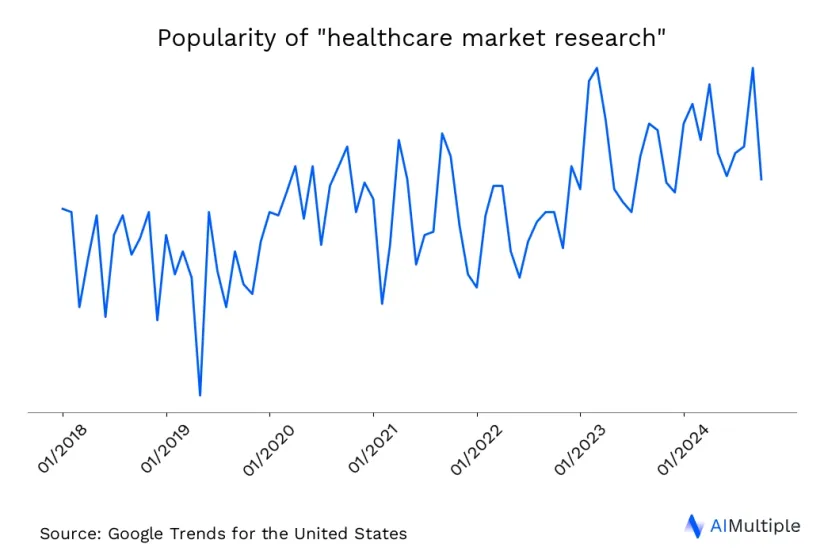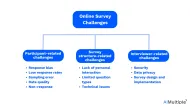By understanding consumer experiences and expectations through market research, businesses can improve these journeys, enhancing overall satisfaction and trust in healthcare services. This approach can lead to tailored solutions that effectively meet consumer needs and streamline their healthcare experiences.
If you are looking for a market research software, check out our vendor guide and a list of top providers.
Learn the benefits of conducting healthcare market research, core market research solutions, and some real-life examples:
Why should healthcare providers conduct market research?
Research shows that there are four major areas that patients care most about but are still dissatisfied with1 :
- obtaining coverage
- understanding benefits
- finding care
- managing care costs.
Market research is crucial for healthcare companies to address consumer dissatisfaction in these areas.
1- Improve healthcare operations and services
Market research gathers essential feedback from physicians, frontline clinicians, and patients, guiding healthcare providers in making changes that are seen as beneficial enhancements rather than impersonal or disruptive.
This patient and employee input is vital for tailoring healthcare services to actual needs and expectations, leading to better patient outcomes and more efficient healthcare delivery.
2- Understand patient satisfaction & sentiment
Market research is crucial in healthcare to understand patient satisfaction and sentiment. The American Customer Satisfaction Index in 2023 rated hospitals 74 out of 100, highlighting the need for improvement.2
Market research provides critical insights into patient experiences, identifying areas needing enhancement and guiding healthcare providers in implementing changes that truly resonate with patients. This research is key to elevating patient satisfaction levels and ensuring that healthcare services align more closely with patient expectations and needs.
To learn more about the applications of sentiment analysis in healthcare, check out our article.
3- Develop new products
With more than 75% of health consumers expecting more accessible, personalized care, market research is invaluable in guiding the development of new healthcare products and services.3
This research helps in understanding patient preferences and emerging health trends, ensuring that new offerings are well-tailored to meet the specific needs of patients.
For more on personalized care, feel free to check out our comprehensive article.
4- Evaluate access to healthcare
Given that research shows one-third of adults have chronic conditions requiring regular healthcare, it’s crucial for providers to understand and improve access to medical services.4
Medical market research practices can highlight barriers to access, such as geographic, financial, or informational challenges, and guide providers in making their services more accessible and inclusive for all patient groups.
Emerging trends in healthcare services
1- Generative AI & digital transformation
Figure 1. Global investments in healthcare technology

Source: Deloitte5
Generative AI is significantly impacting the digital transformation in healthcare, fundamentally changing how data is processed and utilized. Its proficiency in handling unstructured medical data is leading to more efficient and accurate clinical operations. AI technology in healthcare enhances patient care and streamlines administrative tasks, marking a vital shift towards more advanced, data-driven healthcare services.
If interested, check out our article on generative AI in healthcare.
You can also check out the AI use cases in the healthcare industry.
If interested, you can also watch the video below:
2- Mergers & acquisitions (M&A)
Mergers and acquisitions (M&A) is an emerging trend in the healthcare industry and it refers to the process of healthcare organizations joining forces or one entity acquiring another. This trend in healthcare is driven by objectives such as improving service quality, expanding patient access to care, and achieving cost efficiencies.
Through M&A, healthcare providers can pool resources, share expertise, and enhance their capabilities to deliver more comprehensive and integrated care to their patients.
3- Wearable medical products
Wearables are revolutionizing patient monitoring and health management. These devices, ranging from fitness trackers to advanced medical wearables, enable continuous health monitoring, personalized care, and data-driven treatment approaches.
4- Remote healthcare services & medical devices
The concept of medical devices has broadened beyond traditional large-scale machinery to include everyday items like smartwatches, capable of gathering vital medical data. This trend complements the growing preference for virtual healthcare, evidenced by 50% having attended a virtual medical appointment in the last year.6
These developments reflect an evolving healthcare landscape where technology enables continuous health monitoring and convenient access to medical services, reshaping how healthcare is delivered and experienced.
If interested, you can also watch the video about a mobile clinic:
5- Healthcare & well-being mobile apps
Survey across 19 countries shows that 85% of individuals state that their mental health is as important as their physical health.7 Besides, one in four individuals experience mental illness during their lifetime.8
Well-being apps are a cheap and accessible way of helping people to deal with these issues especially for those who cannot receive proper treatment.
Figure 2. Healthcare apps global distribution

Source:Statista9
6- Cybersecurity developments
As healthcare increasingly adopts digital technologies, cybersecurity has become paramount. Research shows that more than 50% of customers express concerns about the security vulnerabilities of their smartphones and smart home devices, and 40% worry about data security on smartwatches and fitness trackers.10
This trend underscores the need for robust cybersecurity measures to protect sensitive health data collected and transmitted by these devices, ensuring patient privacy and trust in digital healthcare solutions.
For a more comprehensive view on cybersecurity in healthcare, check out our article.
Essential methods for conducting healthcare market research
Online surveys
Online surveys in healthcare market research are a versatile and efficient way to gather large amounts of data. They can be designed to capture both qualitative and quantitative information, allowing researchers to understand diverse aspects such as patient satisfaction, treatment effectiveness, and public health trends.
a) Qualitative research
Qualitative research in healthcare delves into the depth and complexity of patients’ experiences, beliefs, and motivations. This approach often provides rich, detailed data that help understand the ‘why’ behind patient behaviors and preferences.
b) Quantitative research
Quantitative research in healthcare focuses on numerical data to quantify behaviors, opinions, and other variables related to health and medicine. This method is crucial for statistical analysis, providing clear, objective data that can inform policy decisions and clinical practices.
If interested, here is our data-driven list of survey participant recruitment services and survey tools.
Focus groups
They involve small, diverse groups of people discussing specific health-related topics, guided by a skilled moderator. This setting is particularly effective in understanding the varied perspectives of patients, caregivers, and healthcare professionals on new treatments, health policies, or service delivery.
In depth interviews
Conducted one-on-one, these interviews allow for a comprehensive exploration of sensitive or complex topics, such as patient experiences with chronic illness, decision-making processes in treatment, or perceptions of healthcare quality.
5 real-life examples of market research in healthcare industry
AI4HealthCro
AI4HealthCro, a collaborative initiative in Croatia, stands as a testament to the transformative power of AI in healthcare.11 This consortium is pioneering AI solutions with ambitious goals: dramatically reducing healthcare costs by an estimated €212.4 billion, saving a substantial number of lives, up to 403,000, and significantly increasing operational efficiency by freeing thousands of man hours annually.
Apple collaboration with Zimmet Biomet
Zimmer Biomet’s collaboration with Apple, resulting in the mymobility™ app and accompanying clinical study, exemplifies how market research in healthcare can drive product development.12
This initiative leverages Apple Watch and iPhone technology to enhance patient care for knee and hip replacements, demonstrating a response to market demands for more integrated and personalized healthcare solutions. The mymobility app aims to improve patient outcomes and reduce healthcare costs, illustrating the potential of market research in identifying patient needs and fostering innovative healthcare solutions.
Advanced – NHS Cyber Attack
The ransomware attack on Advanced, an NHS IT provider, highlights the critical need for robust cybersecurity measures and market research in healthcare.13 Hackers took control of systems, posing potential data theft risks.
The attack disrupted services like patient check-in and NHS 111, with recovery expected to take weeks. Healthcare companies need to ensure and understand evolving cyber threats and develop effective strategies to protect sensitive patient data and healthcare services.
Market research can guide healthcare providers in implementing the latest cybersecurity solutions, ensuring resilience against such attacks.
Five9
Roni Jamesmeyer, senior healthcare manager at Five9, focuses on AI solutions like ChatGPT for ambulance services and highlights the importance of understanding customer needs through market research.14
The findings from their FOI request to NHS Ambulance Trusts reveal a low usage of AI, despite its potential to manage high call volumes and improve patient routing. This underscores the need for comprehensive market research to educate and inform healthcare leaders about AI’s benefits, ensuring technology adoption aligns with actual service requirements and patient care needs.
Apple Health
Figure 3. Healthcare market research statistics of Apple Health

Source: Apple15
Apple’s collaboration with the medical community, as part of its health ecosystem, highlights the importance of market research in healthcare innovation.16 Through ResearchKit and the Research app, Apple enables large-scale participant recruitment for studies, advancing scientific discovery.
Tools like Health Records on iPhone strengthen the physician-patient relationship by providing meaningful health data. Apple’s partnerships in various health studies, such as those focusing on women’s health, heart health, and hearing, demonstrate how market research can drive significant advancements in public health and personalized care.
If interested, check out our data-driven list of market research tools.
You can reach out if you need help in market research:
External Links
- 1. Driving growth through customer experience in healthcare | McKinsey. McKinsey & Company
- 2. Health Care | The American Customer Satisfaction Index. ACSI - The American Customer Satisfaction Index
- 3. “2023 Global Health Care Outlook“. Deloitte. Retrieved December 13,2023.
- 4. “2023 Global Health Care Outlook“. Deloitte. Retrieved December 13,2023.
- 5. “Trends in healthcare tech investments“. Deloitte. Retrieved December 13,2023.
- 6. “2022 Connectivity and Mobile Trends Survey“. Deloitte. Retrieved December 13,2023.
- 7. Global health definition survey | McKinsey. McKinsey & Company
- 8. “2023 Global Health Care Outlook“. Deloitte. Retrieved December 13,2023.
- 9. Top health and meditation apps by monthly downloads 2025| Statista. Statista
- 10. “2022 Connectivity and Mobile Trends Survey“. Deloitte. Retrieved December 13,2023.
- 11. EDIH - AI for Smart Healthcare and Medicine .
- 12. EDIH - AI for Smart Healthcare and Medicine .
- 13. NHS IT supplier held to ransom by hackers. BBC News
- 14. Unlocking the Power of AI in Ambulance Services: A Future-Forward Perspective by Roni Jamesmeyer from Five9" | Healthcare Digital.
- 15. How Apple is empowering people with their health information - Apple. Apple
- 16. How Apple is empowering people with their health information - Apple. Apple





Comments
Your email address will not be published. All fields are required.